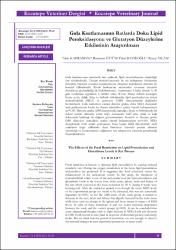| dc.contributor.author | Kahraman, Tahir | |
| dc.contributor.author | Üstün, Ramazan | |
| dc.contributor.author | Bayıroğlu, Fahri | |
| dc.contributor.author | Aslan, Recep | |
| dc.date | 2015-02-25 | |
| dc.date.accessioned | 2015-02-25T11:35:12Z | |
| dc.date.available | 2015-02-25T11:35:12Z | |
| dc.date.issued | 2013 | |
| dc.identifier.issn | 1308-1594 | |
| dc.identifier.uri | http://hdl.handle.net/11630/2323 | |
| dc.description.abstract | Gıda kısıtlamasının metabolik hızı azaltarak, lipid peroksidasyonu düşürdüğü
öne sürülmektedir. Oksijen metabolizmasının bu ara indirgenme ürünlerinin
düzeyleri, hücresel savunma mekanizmasını oluşturan antioksidan sistemler ile
kontrol edilmektedir. Kısıtlı beslemenin antioksidan savunma sistemini
destekleyip güçlendirdiği de bildirilmektedir. Araştırmada 8 hafta süreyle % 50
gıda kısıtlaması uygulanan 6 haftalık erkek Wistar Albino ratların karaciğer,
beyin, testis, dalak, kalp ve böbrek dokularında; lipid peroksidasyon ürünü
malondialdehid (MDA) ve glutatyon (GSH) düzeylerindeki değişimler
incelenmiştir. Gıda kısıtlaması sonrası deneme grubu, doku MDA düzeyinde
artış gözlenmesine karşın bu durum istatistiksel açıdan önemli bulunmamıştır
(p>0.05). Deneme grubu GSH düzeylerinde, karaciğer, beyin ve böbreklerde bir
miktar azalma olmasına karşın testis dokusunda hafif artış, dalak ve kalp
dokusunda herhangi bir değişim gözlenmemiştir. Kontrol ve deneme grubu
GSH düzeyleri, istatistiksel açıdan önemli bulunmamıştır (p>0.05). MDA
düzeylerinde hafif artışın gözlenmesi, buna karşın GSH düzeylerinde hafif
azalmanın tespit edilmesini diyet kısıtlaması sırasında protein alımının
yetersizliği ve homeostazisin sağlanması için adaptasyon amacıyla gerçekleştiği
düşünülmektedir. | en_US |
| dc.description.abstract | Food restriction is known to decrease lipid peroxidation by causing reduced
metabolic rate. During the oxygen metabolism in the body, lipid peroxidation
end-products are generated. It is suggested that food restriction causes the
enhancement of the antioxidant system. In this study, the alterations of
malondialdehid which is one of the end-products of the lipid peroxidation and
glutathione levels in the tissues liver, brain, testis, spleen, heart and kidney of
the rats which exposed to the food restriction by 50 % during 8 weeks were
investigasted. After the restriction period, even though the tissue MDA levels
of the experimental group was found to be increased, this was not statistically
important (p>0.05). As for the GSH levels of the study group, it tended to
decrease in the liver, brain and kidneys but slightly increased in the testis tissue
while there were no change in the spleen and heart tissues in respect of GSH
levels. In spite of these alterations, it was not found statistical importance
between the study and the control groups (p>0.05). It can be concluded that
some adaptational changes such as slight increase in MDA levels and decrease
in GSH levels started to take place in response of decreased protein and energy
intake. But we think that the period of restriction was not enough to observe
the drastical changes in these mentioned parameters in tissue levels. | en_US |
| dc.language.iso | tur | en_US |
| dc.publisher | Afyon Kocatepe Üniversitesi | en_US |
| dc.rights | info:eu-repo/semantics/openAccess | en_US |
| dc.subject | Doku | en_US |
| dc.subject | Gıda Kısıtlaması | en_US |
| dc.subject | Malondialdehit | en_US |
| dc.subject | Redükte Glutatyon | en_US |
| dc.title | Gıda Kısıtlamasının Radarda Doku Lipid Peroksidasyonu ve Glutatyon Düzeylerine Etkilerinin Araştırılması | en_US |
| dc.title.alternative | The Effects of the Food Restriction on Lipid Peroxidation and Glutathione Levels in Rat Tissues | en_US |
| dc.type | article | en_US |
| dc.relation.journal | Kocatepe Veteriner Dergisi | en_US |
| dc.department | Yüzüncü Yıl Üniversitesi, Veteriner Fakültesi., Eczacılık Fakültesi., Tıp Fakültesi | en_US |
| dc.identifier.volume | 6 | en_US |
| dc.identifier.startpage | 19 | en_US |
| dc.identifier.endpage | 24 | en_US |
| dc.identifier.issue | 1 | en_US |
| dc.relation.publicationcategory | Makale - Ulusal Hakemli Dergi - Kurum Yayını | en_US |



















